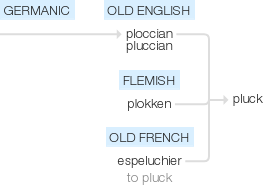Pluck
late Old English ploccian, pluccian, of Germanic origin; related to Flemish plokken ; probably from the base of Old French ( es)peluchier ‘to pluck’. Sense 1 of the noun is originally boxers' slang.
wiktionary
From Middle English plucken, plukken, plockien, from Old English pluccian, ploccian(“to pluck, pull away, tear”), also Old English plyċċan("to pluck, pull, snatch; pluck with desire"; > Modern English plitch), from Proto-Germanic *plukkōną, *plukkijaną(“to pluck”), of uncertain and disputed origin. Perhaps related to Old English pullian(“to pull, draw; pluck off; snatch”). Cognate with Saterland Frisian plukje(“to pluck”), Dutch plukken(“to pluck”), Limburgish plógte(“to pluck”), Low German plukken(“to pluck”), German pflücken(“to pluck, pick”), Danish and Norwegian plukke(“to pick”), Swedish plocka(“to pick, pluck, cull”), Icelandic plokka, plukka(“to pluck, pull”). More at pull.
An alternate etymology suggests Proto-Germanic *plukkōną, *plukkijaną may have been borrowed from an assumed Vulgar Latin *piluccāre, *pilicāre, a derivative of Latin pilāre(“to deprive of hair, make bald, depilate”), from pilus(“hair”). The Oxford English Dictionary, however, finds difficulties with this and cites gaps in historical evidence. [1]
The noun sense of "heart, liver, and lights of an animal" comes from it being plucked out of the carcass after the animal is killed; the sense of "fortitude, boldness" derives from this meaning, originally being a boxing slang denoting a prize-ring, with semantic development from "heart", the symbol of courage, to "fortitude, boldness".
etymonline
pluck (v.)
Middle English plukken, "pull (something) off or out from a surface" (especially hair or feathers, but also teeth), from late Old English ploccian, pluccian "pull off, cull," from West Germanic *plokken (source also of Middle Low German plucken, Middle Dutch plocken, Dutch plukken, Flemish plokken, German pflücken). This is perhaps from an unrecorded Gallo-Roman or Vulgar Latin *piluccare (source of Old French peluchier, late 12c.; Italian piluccare), a frequentative, ultimately from Latin pilare "pull out hair," from pilus "hair" (see pile (n.3)). But despite the similarities, OED finds difficulties with this and cites gaps in historical evidence. From late 14c. as "to pull sharply with a sudden jerk or force (of the strings of a bow, harp, etc.). Related: Plucked; plucking.
To pluck a rose, an expression said to be used by women for going to the necessary house, which in the country usually stands in the garden. [F. Grose, "Classical Dictionary of the Vulgar Tongue," 1785]
This euphemistic use is attested from 1610s. To pluck up "summon up" (courage, heart, etc.) is from c. 1300.
pluck (n.)
c. 1400, plukke, "a pull, a tug, act of plucking," from pluck (v.). Meaning "courage, boldness, determined energy" (1785), originally in pugilism slang, is a figurative use from the earlier meaning "heart, viscera" (1610s) as that which is "plucked" from slaughtered livestock in preparing the carcass for market. This sense also was perhaps influenced by figurative use of the verb in pluck up (one's courage, etc.), attested from c. 1300.
